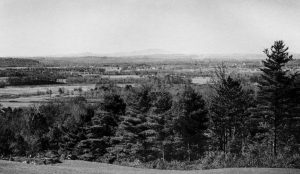We could at length realize the place mountains occupy on the land, and how they come into the general scheme of the universe. When we first climb their summits and observe their lesser irregularities, we do not give credit to the comprehensive intelligence which shaped them; but when afterward we behold their outlines in the horizon, we confess that the hand which moulded their opposite slopes, making one to balance the other, worked round a deep centre, and was privy to the plan of the universe (“A Walk to Wachusett”).
Mount Wachusett is located west of Concord in Princeton, Massachusetts. With an elevation of 2,006 feet (611 m) Wachusett is dwarfed in comparison to many of the other mountains Thoreau would summit in his lifetime. In 1839, three years prior to his first journey to Wachusett, Henry and his brother John Thoreau, Jr. climbed New Hampshire’s Mount Washington (6,288 ft.). Even so Wachusett remained a source of wonder for the two.
Henry and John never made it to Wachusett together, John having died in January 1842. In July of the same year Henry walked to Wachusett with his friend Richard Frederick Fuller. Leaving Concord the morning of 19 July, Thoreau and Fuller walked twenty-five miles west, arriving in West Sterling later that evening. On 20 July they hiked up Wachusett and spent the night on its summit, waking early 21 July to see the sunrise before descending and making their way to Harvard to spend the night. The following morning the two parted ways—Fuller to Groton and Thoreau back home to Concord.
Thoreau writes about their journey to Wachusett in his essay “A Walk to Wachusett”, published with the help of Nathaniel Hawthorne in 1843 in The Boston Miscellany. Thoreau also included a small excerpt of the same essay in A Week on the Concord and Merrimack Rivers. In the years that followed he continued to look west toward Wachusett, describing its distant appearance in his journal.
Thoreau returned to Wachusett in the fall of 1854, this time with Harrison Gray Otis Blake and Thomas Cholmondeley, the three opting to travel by train for the majority of the trip.

Richard Fuller writes about their 1842 trip to Wachusett in his “Visit to the Wachusett”:
The morning of the next day arrived, Mr. Thoreau and myself swallowing a good breakfast, and not heeding a threatened storm, with knapsacks filled with a day’s provisions and a tent to be alternately carried by each, at about a quarter of five, started. We felt all the bracing influences of morning air, and could have descanted long on the wisdom of early-rising, and refuted the arguments of those, who, too fond of the forbidden morning slumber, assert the pre-eminence of a sunset over all other of Nature’s beauties.
It may be well to premise that no incidents worth of note occurred during this pilgrimage to the Wachusett. Other adventures than Nature offered we avoided; and we listen[ed], as we went along, to her harmony. . .
Thoreau writes to Blake on 5 October 1854:
There is a Mr. Thomas Cholmondeley (pronounced Chumly) a young English author, staying at our house at present—who asks me to teach him botany—i.e. anything which I know—and also to make an excursion to some mountain with him. He is a well-behaved person, and possibly I may propose his taking that run to Wachusett with us—if it will be agreeable to you. Nay if I do not hear any objection from you I will consider myself at liberty to invite him
Thoreau writes to Blake on 14 October 1854:
Blake,
I have returned from Plymouth, where I have been detained surveying much longer than I expected.
What do you say to visiting Wachusett next Thursday? I will start at 7 ¼ a.m. unless there is a prospect of a stormy day, go by cars to Westminster, & thence on foot 5 or 6 miles to the mt tops, where I may engage to meet you at (or before) 12.
If the weather is unfavorable, I will try again—on Friday,—& again on Monday.
If a storm comes on after starting, I will seek you at the tavern in Princeton Center, as soon as circumstances will permit.
I shall expect an answer to clinch the bargain

